Navigation: use the links below to view more comments.
first 1-20, 21-25 next last
To: rockinqsranch
2 posted on
12/14/2017 9:34:31 PM PST by
ifinnegan
(Democrats kill babies and harvest their organs to sell)
To: rockinqsranch
In the 1970's something occurred, an event occurred in the U.S.Need more descriptive details... Are you talking about some sex scandal involving a national politician? Some early incident of alleged sexual abuse involving Hollywood celebrities? An especially lascivious episode of some primetime tv show that opened the floodgates?
Regards,
3 posted on
12/14/2017 9:42:26 PM PST by
alexander_busek
(Extraordinary claims require extraordinary evidence.)
To: rockinqsranch
It wasn’t just a single event.
Women entered the workforce in a wave in the ‘70s. It was a corporate mantra: We have to hire more women.
Women were not necessarily trained or proficient in the skills needed in the business — and government positions — that they were being shoehorned into.
Hence, “Human Resources” and other similar departments were created to be staffed by the wave of new hires.
HR departments quickly focused on what those men who had long been in the business or government worlds HAD to do to make women feel more welcome in this new environment.
Add 40 years. Women now rule the corporate and government roosts to the point where even a questionable glance from a man is actionable.
Tyranny, pretty much.
To: rockinqsranch
I was born in the mid-70s...but I don’t think that’s what triggered the mandatory seckshul harassment trainings. At least I HOPE not! :-)
6 posted on
12/14/2017 9:46:10 PM PST by
TXBlair
(We will not forget Benghazi.)
To: rockinqsranch
It was a couple of books-———one by Catherine MacKinnon
....
9 posted on
12/14/2017 9:52:35 PM PST by
Mears
To: rockinqsranch
Sometimes the mind can create false memories.
To: rockinqsranch
Found this:
"Before the 1970s, the term “sexual harassment” would have been met with a blank look. Sexual overtures and disparaging remarks about workers’ competence based on their gender were widely considered acceptable behavior. In 1974, a US district court judge found that a woman whose job was eliminated in retaliation for refusing to have sex with her supervisor was not protected under employment law but was instead facing the personal consequences that may arise when sexual advances are rebuffed. Recognition of sexual harassment as an illegal workplace behavior originated in the US following influential work by Catharine MacKinnon, who argued that sexual harassment is sex discrimination under Title VII of the Civil Rights Act of 1964. In 1980, the US Equal Employment Opportunity Commission (EEOC) issued guidelines defining workplace sexual harassment. Many countries quickly followed the US’s lead in recognizing sexual harassment as an illegal form of workplace behavior. Sexual harassment in the workplace is now internationally condemned as a form of sex discrimination and as a violation of human rights. It is costly to workers and organizations. Yet it remains pervasive. What market failures prevent its eradication, how effective is legislation, and what policies can reduce the incidence?"
Link to site I found this on:
I tried to put this in as a link, but for some reason because its a pdf file, it won't show as a clickable link. You can cut and paste this for the full article:
https://wol.iza.org/uploads/articles/188/pdfs/sexual-harassment-in-workplace.pdf
12 posted on
12/14/2017 10:00:56 PM PST by
mass55th
(Courage is being scared to death - but saddling up anyway...John Wayne)
To: rockinqsranch
House speaker Carl Albert and his little scandal?
But he was a Democrat wasn’t he, so prolly not.
14 posted on
12/14/2017 10:19:29 PM PST by
tumblindice
(America's founding fathers: all white armed conservatives)
To: rockinqsranch
Something happened in the 70's whereby homosexuality went from being criminal, to just disgusting, to tolerable, to just plain adorable.
Something happened in the 70's where living together before marriage went from living in sin, to well I guess their saving money, to it's none of your business, to ain't that sweet.
Something happened in the 70's where druggies were criminals, to druggies were hip yet to be avoided, to where druggies are hip and we need to party with them, to drugs are just another thing to do between work and sleep.
Something happened in the 70's where women were OK doing the things they were genetically tailored to do (maintaining a clean, safe, enriching environment for their husbands and children), to being shamed into going into the workplace, to being shamed if they weren't able to manage children AND a career, to being vaulted into positions of authority at work just to meet quotas.
The future isn't what it used to be.
To: rockinqsranch
That’s when the “I’m OK, you’re OK” meetings took place in the office. I believe it was the beginning of the femminazi movement.
16 posted on
12/14/2017 10:20:33 PM PST by
353FMG
To: rockinqsranch
Wilbur Mills. Never mind.
18 posted on
12/14/2017 10:23:23 PM PST by
tumblindice
(America's founding fathers: all white armed conservatives)
To: rockinqsranch
It was the “You’ve Come a Long Way Baby” ads for Virginia Slims cigarettes for women.
I’m being serious. That was the start of feminism.
To: rockinqsranch
Are you thinking of Tail Hook? That was 1981
30 posted on
12/14/2017 10:57:37 PM PST by
Nifster
(I see puppy dogs in the clouds)
To: rockinqsranch
Internet search is your friend....
one click...
http://time.com/4286575/sexual-harassment-before-anita-hill/
excerpt from article:
The turning point finally came in the mid-1970s, as the women’s liberation movement began to challenge a justice system — as well as a culture at large — that failed to recognize women’s consent. The campaign against sexual harassment was the natural extension of the grassroots anti-rape and anti-battering movements, which grew out of consciousness-raising sessions in which women shared personal stories and realized they were not alone in their experiences.
The phrase “sexual harassment” was coined in 1975, by a group of women at Cornell University. A former employee of the university, Carmita Wood, filed a claim for unemployment benefits after she resigned from her job due to unwanted touching from her supervisor. Cornell had refused Wood’s request for a transfer, and denied her the benefits on the grounds that she quit for “personal reasons.” Wood together with activists at the university’s Human Affairs Office, formed a group called Working Women United. At a Speak Out event hosted by the group, secretaries, mailroom clerks, filmmakers, factory workers and waitresses shared their stories, revealing that the problem extended beyond the university setting. The women spoke of masturbatory displays, threats and pressure to trade sexual favors for promotions.
31 posted on
12/14/2017 10:58:59 PM PST by
Freedom56v2
(#KATE'SWALL Build it Now)
To: rockinqsranch
Anita Bryant outed the homo agenda and paid the price.
32 posted on
12/14/2017 11:15:04 PM PST by
SpaceBar
To: rockinqsranch
I’ve been in the workforce since the 70’s and don’t recall sexual harassment training until after the Tailhook scandal in the Navy in the 90’s.
And that didn’t end up well for the Navy, among other institutions.
35 posted on
12/14/2017 11:28:06 PM PST by
Catmom
(We're all gonna get the punishment only some of us deserve.)
To: rockinqsranch
The ‘70s? Didn’t see it. Maybe the ‘80s.
41 posted on
12/15/2017 12:40:05 AM PST by
familyop
("Welcome to Costco. I love you." --Costco greeter in the movie, "Idiocracy")
To: rockinqsranch
The ‘80s in universities, more likely. I don’t remember hearing it mentioned in private sector offices until the ‘90s.
42 posted on
12/15/2017 12:43:01 AM PST by
familyop
("Welcome to Costco. I love you." --Costco greeter in the movie, "Idiocracy")
To: rockinqsranch
A lot of things happened in the 70’s.
Most of them involved drugs.
43 posted on
12/15/2017 2:48:04 AM PST by
Vermont Lt
(Burn. It. Down.)
To: rockinqsranch
We had to go through that crap in the military.
It was B.S then and it's B.S. now.
The Bible is all we need, and it needs to be the main book upon which public school is founded, and the main book used in teaching,
like our founding fathers intended.
Congressional resolution, September 12, 1782, endorsing Robert Aitken's Bible [page 468]
David C. Claypoole, 1782 from the Journals of Congress

 The war with Britain cut off the supply of Bibles to the United States with the result that
The war with Britain cut off the supply of Bibles to the United States with the result that
on Sept. 11, 1777, Congress instructed its Committee of Commerce to import 20,000 Bibles from "Scotland, Holland or elsewhere."
On January 21, 1781, Philadelphia printer Robert Aitken (1734-1802) petitioned Congress
to officially sanction a publication of the Old and New Testament
which he was preparing at his own expense.
Congress "highly approve the pious and laudable undertaking of Mr. Aitken,
as subservient to the interest of religion . . . in this country, and . . . they recommend this edition of the bible to the inhabitants of the United States."
This resolution was a result of Aitken's successful accomplishment of his project.
Aitken’s Bible
Aitken published Congress's recommendation of September 1782 and related documents (Item 115)
as an imprimatur on the two pages following his title page.
Aitken's Bible, published under Congressional patronage,
was the first English language Bible published on the North American continent.

 "The Bible of the American Revolution"
"The Bible of the American Revolution"
As long as the United States remained under British rule,
the British government forbade the printing of Bibles in America.
When the Colonies declared their independence,
the importation of Bibles became restricted
and by 1777 there was a severe shortage of Bibles in America.
On September 11, 1777, this shortage of Bibles was brought to the attention of the Continental Congress
by its chaplain, Dr. Patrick Allison.
He said in his report that Bibles were urgently needed because, “the use of the Bible is so universal and its importance so great”
and on Dr. Allison’s advice, Congress passed a resolution
to make every attempt to import 20,000 Bibles in English“from Holland, Scotland, or elsewhere, into the different parts of the Union.”
The importation of Bibles soon proved to be nearly impossible
and the Continental Congress had to search for another alternative
to supply the population with their most important book.
On January 21, 1781, the noted colonial printer Robert Aitken petitioned Congress
for both sanction and support for the production of a complete Bible for the American people
and a committee was immediately formed to determine
if Aitken were qualified to produce a book of such significance.
Aitken’s impressive credentials (he had, among other things, been the publisher of the Journals of Congress for the first Congress
and published numerous articles by Thomas Paine)
convinced the committee and on September 10, 1782,
a Congressional Resolution was adopted granting Aitken permission and financial support
for the printing of the first edition of the first American Bible.
George Washington, one of the greatest supporters of the Aitken Bible, was so pleased with the result
that he regretted that the Revolutionary troops had been disbanded
before he could provide them with such an appropriate symbol of his gratitude.
Writing to a friend, Washington lamented, "It would have pleased me well,
if Congress had been pleased to make such an important present
(a copy of the Aitken Bible) to the brave fellows,
who have done so much for the security of their Country's rights and establishment."
The printing of the new Bible marked a significant moment in the history of the United States.
More American versions of the Bible soon followed
and, no longer subject to British editions of the Bible, the United States was,
for the first time, able to fully express the freedom of religion held so dearly by the population.
The Aitken Bible was championed by the people
and symbolized a dramatic release from British, and indeed government control,
over their right and ability to worship.
I also found out that the Aitken 1782 Holy Bible was called by Congress the
Also see http://courses.ischool.berkeley.edu/i182ac/s01/third78.html
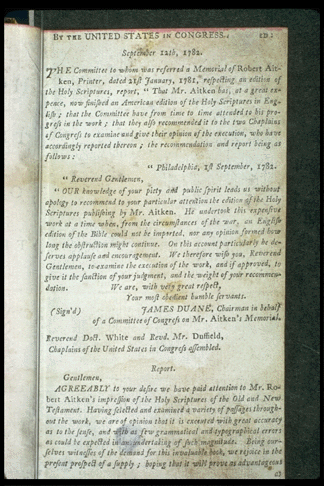
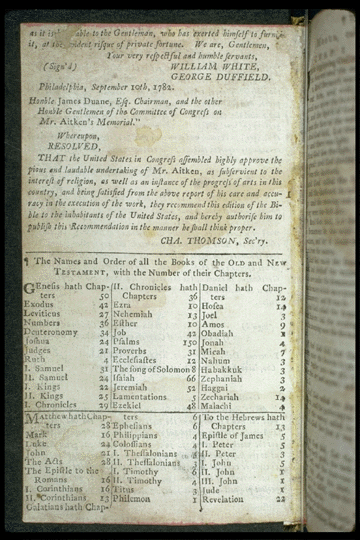
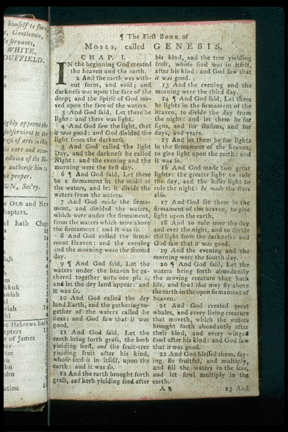
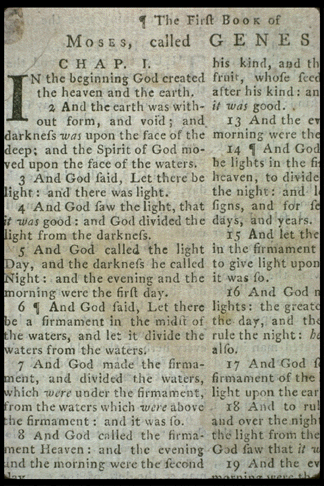
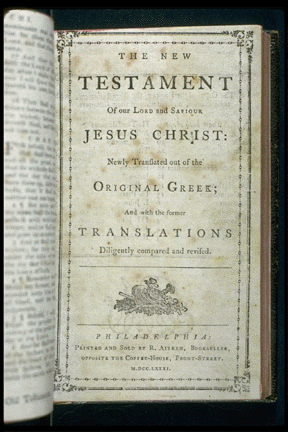

Although 10,000 copies of the Aitken Bible were printed, the first printing is extraordinarily scarce today.
20th-century estimates place the number of extant copies between 30-40, with possibly five (certainly no more than ten) in private hands.
It is one of the world’s rarest books, significantly rarer than even the Gutenberg Bible.
The photo of the copy to the left is an extraordinarily scarce first edition,
one of approximately 30 known copies (with perhaps only five in private hands),
of the first English Bible printed in America,
the first and only Bible ever to be printed with Congressional approval.
An absolutely extraordinary copy of a most rare and important volume.
45 posted on
12/15/2017 4:50:32 AM PST by
Yosemitest
(It's SIMPLE ! ... Fight, ... or Die !)
Navigation: use the links below to view more comments.
first 1-20, 21-25 next last
FreeRepublic.com is powered by software copyright 2000-2008 John Robinson

 The war with Britain cut off the supply of Bibles to the United States with the result that
The war with Britain cut off the supply of Bibles to the United States with the result that 
 "The Bible of the American Revolution"
"The Bible of the American Revolution"




